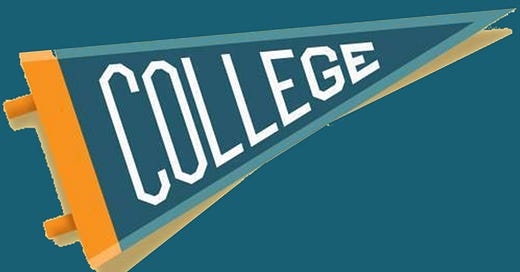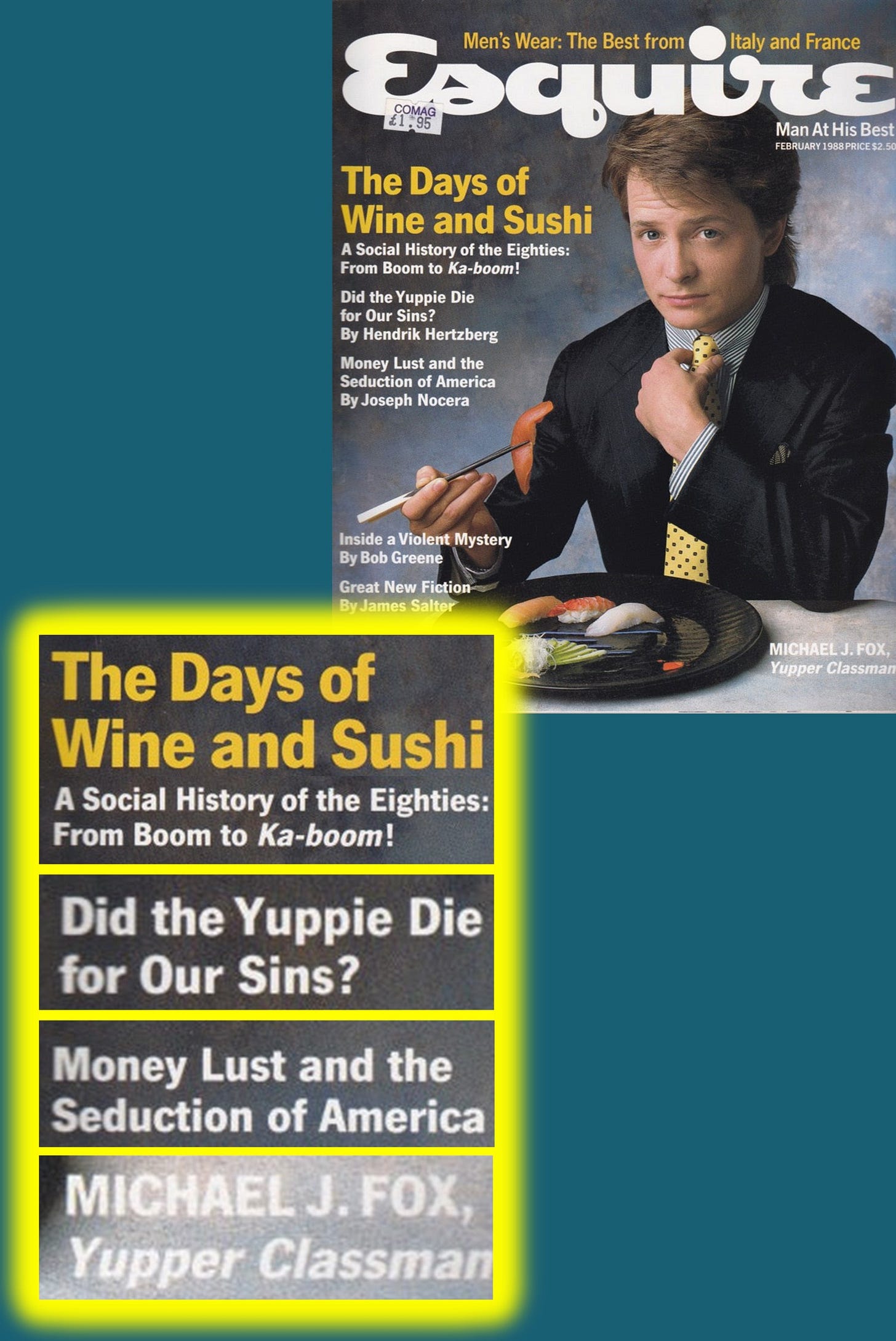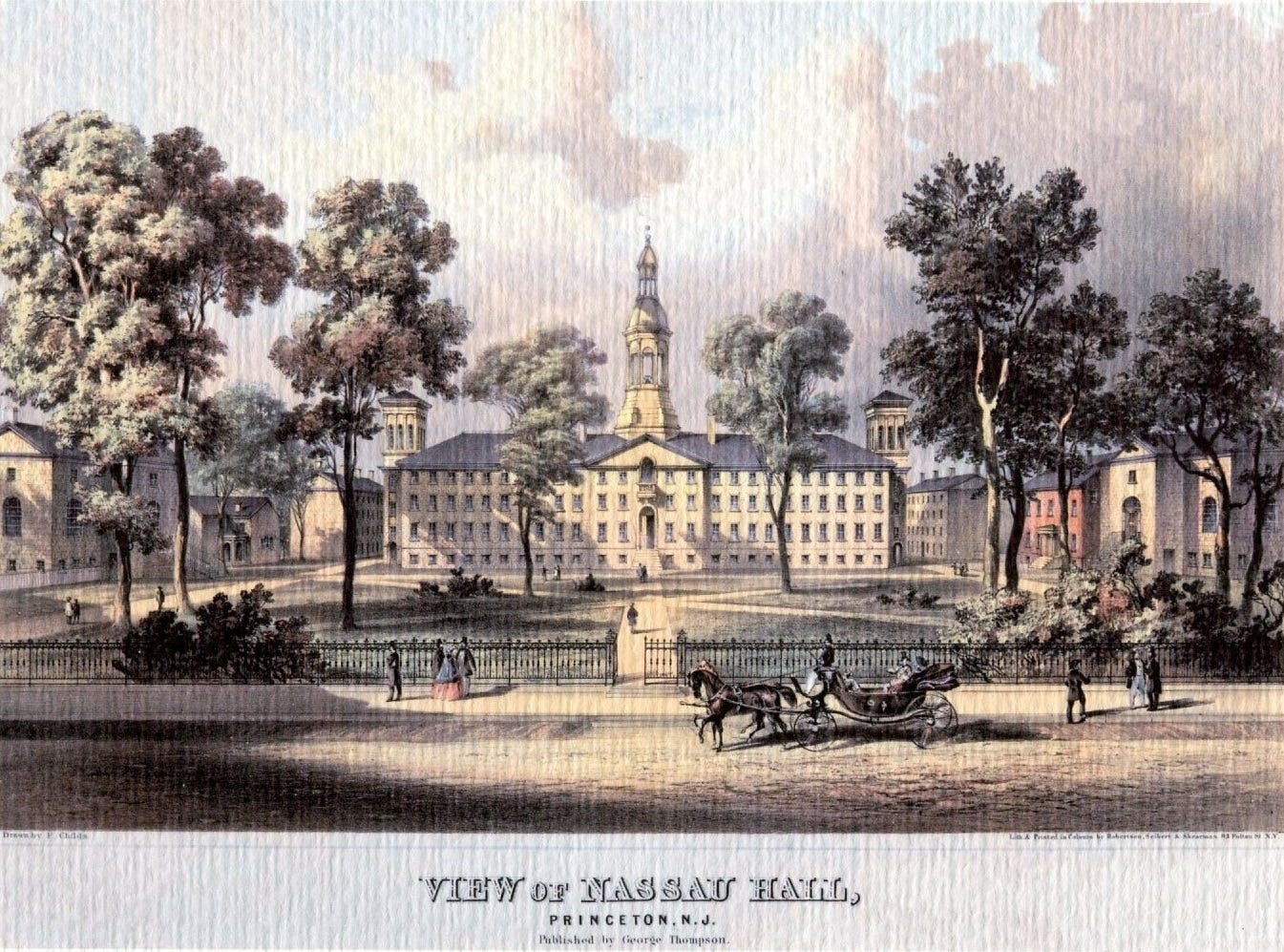IlIusions of Merit
The Later 20th Century Set the Stage for Clown World. The Bizzarity of "College" was a Big Part.
A lot of the social changes leading to clown world distorted or inverted traditional culture into centralized clown show caricatures. Pre-war America was stratified, but it was also relatively local and organic. The original federal system was built on distinct entities. Each state had regional microcultures. Cutting across this, local class distinctions. And rural, town, and urban cultures. There were common identifiers, but different socio-cultures were the norm.
Esquire magazine, Feb., 1988. This not only isn’t a parody, the highlights are from a single Boomer lifestyle mag cover. The noontide of the boomer had to be experienced to be appreciated. There is no incompatibility between [seeing where it was headed in my late teens] and [not claiming to be boy Nostradamus]. The obviousness is … well … obvious when that’s what mainstream popular socio-cultural discourse for the age 24-42 set looked like.
The big picture is that post-war TV-driven mass consumer culture was centralizing and homogenizing. Switching out reality for screen = same House of Lies for everyone. Things that hadn’t even been on the radar were suddenly presented as aspirational. Meanwhile, mass living standards were soaring. Materialist class consciousness introduced the desire for ”high class” trappings in ordinary life. And the cultural conception of “higher education” changed radically.
John Landis, National Lampoon's Animal House, 1978, Universal Studios; Lawrence Kasdan, The Big Chill, 1983, Columbia Pictures
Boomers understand reality mainly through TV and Pedowood, with some selective social media. It’s why they're most ensorcelled by the House of Lies and their men are the most Gamma of cohorts. Obviously oversimplifying a little, but the Boomer conception of college we absorbed by osmosis could be summed up in two movies.
Animal House was a 1978 film set in 1962. The oldest boomers were turning 17, so it wasn’t exactly a nostalgia piece. More retconning early memories to glorify atavism and cultural degeneration. The insightful part was nailing the hollow, morally bankrupt worthlessness of post-War “institutions”. But the problem presenting [hypocritical worthless trash] vs. [atavistic worthless trash as the only options. Making the atavistic one “cool” is boomer-era media 101. The Big Chill is the unofficial bookend. Reassurance that that oh-so-seminal youthful waste of time really would always be meaningful. The film came on my radar first term of college when one large and uncool knot of freshman were consciously trying to pre-create their own “Big Chill moments”. Note how no boomers you know remain tight with their college friends. Neither did that group.
These proved archetypal - hence our own updates.
Jeff Kanew, Revenge of the Nerds, 1984, 20th Century Fox; Joel Schumacher, St. Elmo's Fire, 1985, Columbia Pictures
The American university is a weird pastiche of Western elements starting with medieval schools and running through Renaissance humanism, Enlightenment materialism, and Modern credentialism. The 20th-century version is fundamentally incoherent. Seriously. Define the modern university or its function concisely. It’s a socio-cultural colossus, but a nebulous one, where wisps of quasi-mythical New England academies, Oxford & Cambridge, the Bauhaus, Bell Labs, and Utopia float by without resolution. Just an aside, but a big part of the problem with modern universities is this lack of definable purpose. There are others.
Stick to college - a strange and distinct piece of the aspirational mainstream starting with our generation. The Boomers bloated the numbers, but [college = necessary] wasn’t mass parental assumption yet for them. They were still in “every generation richer than its parents mode”, so the Greatest NPCs saw this as upward mobility to be proud of. Gen X and after got it served up as a) assumed next step for anyone “serious” and b) necessary credential for House of Lies busywork. And by extension, stuff in a financializing economy.
College in the before times was a more uniform experience. Way fewer programs, campus amenities, delivery options, and untraditional students. The beast hadn’t fully realized the potential for graft and social engineering at this point. And credentialism wasn’t as bad. Four-year program with an ever-growing set of majors with varying levels of effort. Presumably a basic intellectual skill set for a slot in the House of Lies or professional or graduate school. From the outside, the reality is bizarre. The time is inefficiently spent for the amount of knowledge amassed and the socialization is socially unproductive, big picture. It wasn’t as useless as now though. Some programs were demanding and if motivated to learn, the opportunity was there. Some probably still are - it’s the preponderance. And the overall ease of getting through.
F. Childs, View of Nassau Hall, Princeton, N.J., c. 1860, lithograph, pub. Robertson, Seibert & Scherman
Special Boy Colleges (SBCs) were the historical - and definitely mass cultural - template. These were another Frankenstein pastiche. The origins were in the blue blood finishing schools of the Gilded Age elites. But they provided support for higher scholarship by default. Faculty, then as now, had time and means to write. But it was a specific cultural phenomenon. Few went, it was very expensive, and it served a classical education based on Renaissance humanism, the Grand Tour, German Idealism, and English boarding schools. Manly virtues were encouraged as part of this “well-rounded” formation for an elite. Work wasn’t the be all and end all - the “Gentleman’s C” comes from this era. Networking continued from prepping together then moved into a place in society.
What changed this was admitting hardship cases on merit. Modernity eroded aristocratic structures across the West. The idea seems sound - increase the talent pool by trawling the underclasses. But it transforms what the institution is on an existential level. [Aristocratic finishing] and [scholarship opportunity for high achievers] are not the same organizational identity. This is where lack of defined organizational purpose reads its head. Bodies with such things can’t radically become something else overnight.
Somewhere along the line the SBCs went full “meritocratic”. Not sure when - probably during that fleeting post-War era people point to as if it was perpetually normative. In reality, the pretense that civnat rhetoric was real could be sustained for about a generation or two. The old social institutional prestige magically → intellectual prestige through great waves of Progress!. SBCs were rich enough to offer generous aid and already had names - and barriers to entry did the rest. Take the highly talented, put them through a demanding program and get something good for society. Hardly radical. Other countries peg admissions to national exams. The problem was two masters. Or no definable identity.
First, the merit standard was a judgment call from go. And like most late beast system judgment calls, steadily self-beclowning. Compared to today’s clown pillars, there’s something naïve about middle class kids aspiring to SBCs with mass market guidebooks.
Personal anecdote. I embraced the process for my own reasons. For an unintuitive read and react child, Gamma parenting is disorienting. You learn to adapt to the delusion bubble instead of considering all the possibilities. “Not going to college” wasn’t thinkable due to my own conditioning and limitations at the time. But getting away from home was a driving imperative by junior year. And it was clear for Gamma reasons that only an SBC would get me out of state. This meant sacrificing to a degree to meet the extensive paper qualifications. But it also brought more Gamma conflict. To no one’s surprise, the person driven to turn [getting into SBC] into the seminal conflict of my teens didn’t understand what the process entailed. And wouldn’t learn for reasons covered in the last sub.
Caspar David Friedrich, Wanderer above the Sea of Fog, around 1818, oil on canvas, Hamburger Kunsthalle, Hamburg
Gamma parenting is so toxic because nothing is ever straightforwardly direct or real. Posturing, lies, emotional incontinence and weird obsessions are the norm. There’s never been a straight answer in the decades since why SBC was worth permanently shattering a parent-child relationship. When seeing through lies is second nature, a recurring liar is tiresome. One retcon was that “this was the place where someone like you would be at home”. Abject nonsense, given the objective lack of interest in or understanding of me that continues until today. It’s critical in life to ignore fictional chatter and observe the subtle fruits.
[Unilateral decision to put SBC stickers on all his vehicles]
+
[Candid comments about “what I would have done to be able to…”]
+
[vivid delusions about “what it’s like” that are dead wrong]
+
[Gamma]
____________________________________________________________
Clear enoughProjection of some deep personal cobblestone in the substructure that can never be admitted because reasons. And like any Gamma projection, woefully out of alignment with reality. Monomania over grades was like all the other self-immolating Gamma advice. Another obstacle to overcome before the reality could be figured out and reverse engineered. In the analog era, this meant carefully studying the guidebooks he kept buying and not reading. And building the “well-rounded excellence” the gurus all blathered about.
The end result illustrates another personal maxim along with set goals and chart course backwards. Maintain frame and get what you need. The family boomer got to prance around his cohort and pretend years of screaming about my not vying for valedictorian did something. With stickers to prove it.
Enrico Coleman, A Daring Escape, 19th century, pencil and watercolor laid on card
I got away.
The point is, merit was undefined. And there were way more capable applicants than spots. A subjective assessment of text scores, activities, academics, and identity = no set formula like a national exam. And a lot of other modifiers were in play. Social engineering set-asides. Preferential treatment for alumni kids. Lowered standards for athletic recruits. And no way to assess anything because the process was a black box. There were a disproportionate number of bright kids there compared to NUC public high school. But some real dolts and a preponderance of arrogant midwits.
Even without fudging or lying, the system was highly manipulatable. So as the locusts took over, more and more space was carved out for the usual reasons. Until we reach the current day. But the process was never the pure filtering of best and brightest it was presented as. Consider the quality of the beast system apparatchiks that the SNCs boast about. Extrapolate back. The internal contradiction was always there to be exploited. It was obvious from inside. The lesson is to be clear in purpose and hold to it. The unstated thing “we all know” is insidious.
My first glimpse of what I later learned was the House of Lies occurred sophomore year and changed my life. There were no answers, but the realization that the whole mess I’d been trying to ORR through was fake was liberating. It also eliminated the usual SBC circa late 80s paths like Wall St. or law school. Not that it wasn’t a valuable experience. Just a different one from what most assume. Vapid materialists could never grasp the impact of the whole background for a life of reading and reacting just going poof. It was the system. Get into college, doors open, etc. But no one told us the halls they opened onto were fake and ghastly. Skeptical? Consider American prospects before and after the SBC meritocracy… It’s almost as important a pillar of the House of Lies as media.
Of course no one believed me. And I had no perspective to chart a new course in real time. The remaining years were spent developing personally - physically, mentally, and socially. The family boomers still carry a grudge. Whatever. It was obvious that regardless of what the new path was going to be, I needed to level up. A lot. And not in SBC ways. That may be the most valuable lesson. Serving liars has always been intolerable. When things aren’t as you thought they’d be, upping your own game is a great response.
Nikas Safronov, Dream of a Sky Castle, 21st century, oil on canvas
















Up your own game is the only way.
I try to teach that to students that can hear. The only skill to learn is to teach yourself. Improve. There is no magic paper.
I was woefully disappointed in kawlej. It was a box ticking waste of money and time. I thought I'd learn things and be taught to really THINK.
Nope. Tick the box and move on to next course. Get paper. Get job. Only there were no jobs....